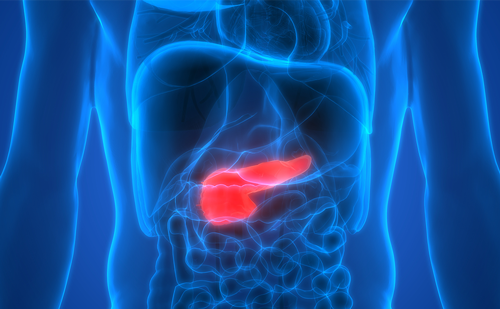What’s new in GI oncology? With the 2025 ASCO Gastrointestinal Cancers Symposium still fresh in our minds, we hear from leading experts on the key abstracts and presentations from the conference in the fields of colorectal and pancreatic cancer.
Circulating Tumour DNA in Colorectal Cancer

Dr Eric Lander (Director of Research at Minnesota Oncology – Minneapolis, MN, USA)
“Circulating tumour DNA continued to be a hot topic in patients with colorectal cancer. The BESPOKE CRC study assessed the impact of ctDNA testing (Signatera™) on adjuvant therapy decisions for stage II and III colorectal cancer. This prospective, observational study included 1,166 patients, 55% with stage III disease. Providers changed treatment decisions in 16.3% of cases, leading to de-escalation in 59.9% and escalation in 35.7%. Positive post-operative ctDNA results were associated with inferior disease-free survival. Among stage II patients, 7.5% had positive ctDNA within six weeks post-surgery, compared to 28% of stage III patients.”
“ctDNA clearance during and after chemotherapy correlated with better disease-free survival. Of patients with recurrence and positive ctDNA, 30% received oligometastasis-directed therapy, higher than historical rates. This may indicate earlier metastasis detection or evolving treatment patterns. Like CIRCULATE-Japan, adjuvant chemotherapy did not improve survival in patients with negative ctDNA. Patients should consider enrolling in NRG-GI008 (CIRCULATE-North America), which randomizes stage III patients based on ctDNA status to standard chemotherapy or observation. The trial aims to validate ctDNA’s role as a predictive biomarker. Randomized trials remain necessary to confirm its utility in adjuvant therapy for resected colon cancer.”
Top clinical trials in colorectal cancer

Dr Benjamin Weinberg (Georgetown University, Washington, DC, USA)
Checkmate 8HW
“Perhaps the most impactful was the long-awaited results of the Checkmate 8HW study, which compared nivolumab plus ipilimumab vs. nivolumab monotherapy in mismatch repair deficient/microsatellite instability-high metastatic colorectal cancer. Combination immunotherapy improved median progression-free survival (PFS) (not reached vs. 39.3 months, HR 0.62, P = 0.0003) and 3-year landmark PFS (68% vs. 51%). Response rates were also higher (71% vs. 58%, P = 0.0011). Though toxicity increased, severe adverse events were rare (9% vs. 4%). These findings support the usage of combination immunotherapy in this patient population, particularly for younger, fitter, and more symptomatic patients.”
BREAKWATER: BRAF V600E-mutated colorectal cancer
“Another important update in the colorectal space was the discussion of the BREAKWATER study (Kopetz et al. abstract 16) which randomized patients with BRAF V600E-mutated metastatic colorectal cancer in the first-line setting 1:1:1 to encorafenib/cetuximab, encorafenib/cetuximab plus FOLFOX chemotherapy, or standard-of-care chemotherapy (FOLFOX, CAPOX, or FOLFOXIRI, bevacizumab). The combination of encorafenib/cetuximab/FOLFOX showed superior response rates (60.9% vs. 40.0%, OR 2.443, P = 0.0008) and a trend toward improved overall survival (not estimable vs. 14.6 months, HR 0.47, P = 0.0000454). These findings support the recent accelerated FDA approval of first-line encorafenib/cetuximab/FOLFOX.”
Botensilimab/balstilimab: Microsatellite stable colorectal cancer
“A phase II study of botensilimab (anti-CTLA-4) and balstilimab (anti-PD-1) in refractory microsatellite stable metastatic colorectal cancer without liver metastases showed a 19% response rate and 55% disease control rate in the 75 mg combination arm, with lower adverse event rates than the 150 mg arm (Fakih et al. abstract 23).”
Daraxonrasib shows promise in KRAS-mutated pancreatic cancer
“Finally, perhaps the most exciting data in pancreatic cancer concerns the oral RAS(ON) inhibitor daraxonrasib (RMC-6236, Garrido-Laguna et al. abstract 722). The oral RAS(ON) inhibitor daraxonrasib (RMC-6236) showed a 36% response rate in KRAS G12X-mutated pancreatic cancer, with a PFS of 8.8 months. These early data are tantalizingly positive for a patient population that has not yet seen any discernible benefit from targetable therapies. There is an ongoing phase III trial (NCT06625320) randomizing patients in the second-line setting to daraxonrasib vs. chemotherapy, and many other KRAS-targeting agents are in development. The KRAS-inhibitor story will be one to continue to watch closely throughout 2025 and beyond.”
Disclosures: Benjamin Weinberg has received grant/research support from Ipsen, is on the Advisory Board for Bayer and Taiho, and is a Speaker’s Bureau participant with Bayer, Lilly, Taiho, Sirtex, AstraZeneca and Daiichi Sankyo. Eric Lander has no financial or non-financial conflicts of interest to declare in relation to this article.
This content has been developed independently by Touch Medical Media for touchONCOLOGY. It is not affiliated with the 2025 ASCO Gastrointestinal Cancers Symposium. Views expressed are the speaker’s own and do not necessarily reflect the views of Touch Medical Media.
SIGN UP to touchONCOLOGY!
Join our global community today for access to thousands of peer-reviewed articles, expert insights, and learn-on-the-go education across 150+ specialties, plus concise email updates and newsletters so you never miss out.
Click here to REGISTER NOW >>>







